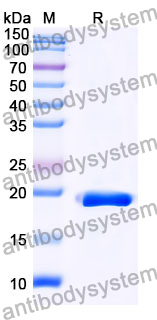Catalog No.
YMJ82101
Expression system
E. coli
Species
Mus musculus (Mouse)
Protein length
Ser26-Asn176
Predicted molecular weight
19.46 kDa
Nature
Recombinant
Endotoxin level
Please contact with the lab for this information.
Purity
>90% as determined by SDS-PAGE.
Accession
Q64695
Applications
ELISA, Immunogen, SDS-PAGE, WB, Bioactivity testing in progress
Form
Lyophilized
Storage buffer
Lyophilized from a solution in PBS pH 7.4, 0.02% NLS, 1mM EDTA, 4% Trehalose, 1% Mannitol.
Reconstitution
Reconstitute in sterile water for a stock solution. A copy of datasheet will be provided with the products, please refer to it for details.
Shipping
In general, proteins are provided as lyophilized powder/frozen liquid. They are shipped out with dry ice/blue ice unless customers require otherwise.
Stability and Storage
Use a manual defrost freezer and avoid repeated freeze thaw cycles. Store at 2 to 8°C for frequent use. Store at -20 to -80°C for twelve months from the date of receipt.
Alternative Names
Endothelial protein C receptor, PROCR, EPCR, APC receptor, Endothelial cell protein C receptor, CD201, Activated protein C receptor
Human endothelial colony forming cells (ECFCs) require endothelial protein C receptor (EPCR) for cell cycle progression and angiogenic activity., PMID:40407837
Endothelial Protein C Receptor: A Multifunctional Mediator in the Pathophysiology of Rheumatoid Arthritis., PMID:40214439
Endothelial protein C receptor promotes retinal neovascularization through heme catabolism., PMID:39948347
Endothelium Modulates the Prothrombotic Phenotype of Factor V Leiden: Evidence From an Ex Vivo Model., PMID:39846164
Broadly inhibitory antibodies to severe malaria virulence proteins., PMID:39567685
A systems serology approach to identifying key antibody correlates of protection from cerebral malaria in Malawian children., PMID:39267089
Mosaic and cocktail capsid-virus-like particle vaccines for induction of antibodies against the EPCR-binding CIDRα1 domain of PfEMP1., PMID:39046960
An orthosteric/allosteric bivalent peptide agonist comprising covalently linked protease-activated receptor-derived peptides mimics in vitro and in vivo activities of activated protein C., PMID:38670314
Calcified apoptotic vesicles from PROCR+ fibroblasts initiate heterotopic ossification., PMID:38594791
CD201+ fascia progenitors choreograph injury repair., PMID:37968392
Comprehensive cell surface protein profiling of human mesenchymal stromal cells from peritoneal dialysis effluent and comparison with those from human bone marrow and adipose tissue., PMID:37603218
EPCR deficiency ameliorates inflammatory arthritis in mice by suppressing the activation and migration of T cells and dendritic cells., PMID:37228024
Microvascular Environment Influences Brain Microvascular Heterogeneity: Relative Roles of Astrocytes and Oligodendrocytes for the EPCR Expression in the Brain Endothelium., PMID:37108071
Are H1 and H3 haplotypes of endothelial protein C receptor (PROCR) an important factor in contracting COVID-19?, PMID:35710974
Quercetin attenuates adipogenesis and fibrosis in human skeletal muscle., PMID:35605401
Distinct Dominant Lineage from In Vitro Expanded Adipose-Derived Stem Cells (ASCs) Exhibits Enhanced Wound Healing Properties., PMID:35406800
Elucidating mechanisms of genetic cross-disease associations at the PROCR vascular disease locus., PMID:35264566
Multi-modal profiling of human fetal liver hematopoietic stem cells reveals the molecular signature of engraftment., PMID:35232959
Protein C receptor maintains cancer stem cell properties via activating lipid synthesis in nasopharyngeal carcinoma., PMID:35169126
Thrombotic Risk Determined by Protein C Receptor (PROCR) Variants among Middle-Aged and Older Adults: A Population-Based Cohort Study., PMID:35021256
Col6a1+/CD201+ mesenchymal cells regulate intestinal morphogenesis and homeostasis., PMID:34910257
Determinants of brain swelling in pediatric and adult cerebral malaria., PMID:34549725
Relationship between serum soluble endothelial protein C receptor level and COVID-19 findings., PMID:34321403
Lentiviral CRISPR-guided RNA library screening identified Adam17 as an upstream negative regulator of Procr in mammary epithelium., PMID:34281556
Malian adults maintain serologic responses to virulent PfEMP1s amid seasonal patterns of fluctuation., PMID:34257318
Search for Novel Plasma Membrane Proteins as Potential Biomarkers in Human Mesenchymal Stem Cells Derived from Dental Pulp, Adipose Tissue, Bone Marrow, and Hair Follicle., PMID:34230997
Enhanced HSC-like cell generation from mouse pluripotent stem cells in a 3D induction system cocultured with stromal cells., PMID:34147128
Sickle-trait hemoglobin reduces adhesion to both CD36 and EPCR by Plasmodium falciparum-infected erythrocytes., PMID:34115805
Gene knockout in highly purified mouse hematopoietic stem cells by CRISPR/Cas9 technology., PMID:33957108
Could Soluble Endothelial Protein C Receptor Levels Recognize SARS-CoV2-Positive Patients Requiring Hospitalization?, PMID:33756504
PfEMP1 A-Type ICAM-1-Binding Domains Are Not Associated with Cerebral Malaria in Beninese Children., PMID:33203751
Activated protein C and PAR1-derived and PAR3-derived peptides are anti-inflammatory by suppressing macrophage NLRP3 inflammasomes., PMID:33049092
Determining the association of thrombophilic gene polymorphisms with recurrent pregnancy loss in Iranian women., PMID:32496885
Identification of two major autoantigens negatively regulating endothelial activation in Takayasu arteritis., PMID:32152303
Evolution of ASC Immunophenotypical Subsets During Expansion In Vitro., PMID:32093036
Down-regulation of endothelial protein C receptor promotes preeclampsia by affecting actin polymerization., PMID:32003123
CD34 and EPCR coordinately enrich functional murine hematopoietic stem cells under normal and inflammatory conditions., PMID:31863798
Halting triple negative breast cancer by targeting PROCR., PMID:31619763
Plasma levels of protein C pathway proteins and brain magnetic resonance imaging volumes in multiple sclerosis., PMID:31408242
Binding Heterogeneity of Plasmodium falciparum to Engineered 3D Brain Microvessels Is Mediated by EPCR and ICAM-1., PMID:31138740
CD27, CD201, FLT3, CD48, and CD150 cell surface staining identifies long-term mouse hematopoietic stem cells in immunodeficient non-obese diabetic severe combined immune deficient-derived strains., PMID:31073070
Justification of specific genetic modifications in pigs for clinical organ xenotransplantation., PMID:30989742
The Cardioprotective Signaling Activity of Activated Protein C in Heart Failure and Ischemic Heart Diseases., PMID:30974752
Resistin impairs activation of protein C by suppressing EPCR and increasing SP1 expression., PMID:30551547
Alterations of anticoagulant proteins and soluble endothelial protein C receptor in thalassemia patients of Chinese origin., PMID:30384036
Genetics of the thrombomodulin-endothelial cell protein C receptor system and the risk of early-onset ischemic stroke., PMID:30383853
Acquisition of Antibodies Against Endothelial Protein C Receptor-Binding Domains of Plasmodium falciparum Erythrocyte Membrane Protein 1 in Children with Severe Malaria., PMID:30365003
Blood outgrowth endothelial cells (BOECs) as a novel tool for studying adhesion of Plasmodium falciparum-infected erythrocytes., PMID:30300360
Phosphatidylcholine in the groove of endothelial cell protein C receptor (EPCR) regulates EPCR conformation and protein C recognition., PMID:30281048
The H1 haplotype of the endothelial protein C receptor protects against arterial thrombosis in patients with antiphospholipid syndrome., PMID:30048851

